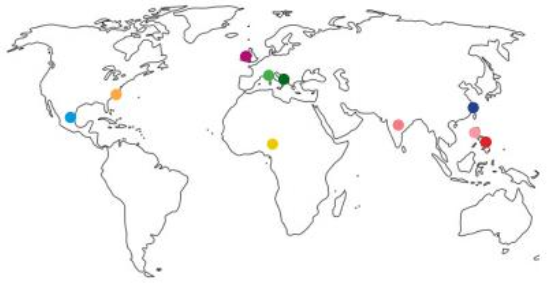Lily Reslink|Marlin Chronicle
During January Term, Dr. Taryn Myers, professor and chair of Psychology, teaches “PSY 385: Psychology of Eating Disorders.” The topic is fresh in the minds of students who took the class, and particularly relevant for Eating Disorder Awareness Week, spanning Feb. 26 to March 3, the topic of eating disorders has received an increase in attention.
For many college students, disordered eating and body image struggles are a lived reality. “It is a big issue for college students,” Myers said, “and certain things about college can really influence it.”
According to a 2023 article published in Child Mind Institute, the National Eating Disorders Association (NEDA) estimates that “between 10 and 20% of women and 4 to 10% of men in college suffer from an eating disorder, and rates are on the rise.”
Myers acknowledged the vulnerability of college students to the issue. “I think there’s just a lot of stress already going on in college, and then you’re thrown together in an environment where your peers become way more influential,” Myers said.
The Child Mind Institute article wrote, “The challenges of college life, adding pressure to underlying mental health issues, create what Alison Baker, MD, calls a ‘perfect storm’ for these disorders, the most common of which are anorexia and bulimia.” The article continued, “The storm occurs when the realities of college life—increased workload, less structure, and more focus on peers—collide with anxieties, learning issues, or poor self-esteem.”
According to Myers, potential contributing factors don’t end there. Myers has extensively researched risk factors for developing eating disorders, much of which focus on the influence of media. “I study things like social comparison to images of celebrities, images on social media,” Myers said.
One example of media influence is the “Freshman 15,” a college weight gain stereotype that plagues the minds of many individuals entering this new stage in their life.
“The really interesting thing to me about the ‘Freshman 15’ is Seventeen magazine made it up,” Myers said. “They published an article about the ‘Freshman 15’ and how to avoid gaining it, and it was the first time anyone had used that term.” She said that this kind of media is often linked to dieting fads in association with their advertisers, and is not based in science.
Myers, through both her course and research, aims to shed light on the issue and identify paths to create a brighter outlook. Myers’ research includes the identification of protective factors that encourage a more positive body image, but also the examination of risk factors that serve as obstacles to doing so.
As for the structure of the January class, Myers said, “I made it entirely discussion based. We read a lot of primary source material…, but also we read two different autobiographies by people who have struggled with eating disorders themselves, so that the students get a chance to experience what it’s like for them through their writing.”
As Myers teaches this course to college students, she recognizes the prevalence of the material to this demographic.
Senior recreational therapy major Riley Walton said she appreciated Myers’ approach. Walton said that the material resonated closely with her experiences, so it was better coming from someone knowledgeable and understanding of sensitivities regarding the subject.
Walton pointed out the social pressure incoming college students often face. “I just feel like everybody tries to meet these standards that society sets for us in order to feel like they belong and fit in,” Walton said.
Having been a part of the field hockey team, Walton has observed the realities of body image issues manifesting in college athletes.
Walton said that while more conservation and advocacy should be done externally, the course did create a positive environment for discussion. Regardless of background knowledge, Walton encourages people to take the course.
Myers has taught this class for years, and has gotten to observe many students’ responses to these takeaways. “People really get passionate about it. And I really appreciate that, and they start relating it to their lives and people they’ve seen that they might need to kind of reach out to you and try to help them get support,” Myers said.

Dr. Taryn Myers |Courtesy
Dr. Myers conducted a study on the link between dolls’ figures and body dissatisfaction of the children that played with them.
Myers said that a course she took in college inspired her development of PSY 385. “I ended up doing an independent research project after I took that course based on the paper I wrote for the class, and then that sort of sent me on my professional trajectory, essentially,” Myers said.
Considering the impact it had on her life, Myers said, “My hope is that it will have an impact that way on other people’s lives.”
Junior biology major Marco Molino took the class out of personal interest. Molino said he hoped this class would provide him with some background knowledge to help those close to him who have been affected.
As for the content of the course, Molino said it largely focused on “understanding the systems that can lead to the development of eating disorders.” He said that it provided him understanding on how these factors could range from large-scale systems in modern America to environmental pressures to familial dynamics.
Molino also spoke on how eating disorders might not have anything to do with the food itself. “A big part of why people develop eating disorders is a loss of control, and that can take a lot of different forms,” Molino said, and one way that individuals will exert control is over food.
Molino said that the “Freshman 15” stereotype can inflict too much pressure on students in a time of adjustment. He said that it creates more to focus on in addition to all the stress of managing a busy schedule and trying to succeed in college.
Molino pointed out that “the likelihood that somebody has or is struggling with some level of eating disorder, or has some weird relationship with food or their body” is quite high.
In addition to the plethora of data out there from experts in the field, Myers research supports this statement. “I found typically somewhere between a quarter to a third of my samples would meet criteria for an eating disorder,” Myers said.
VWU Counseling Services provided their insight, emphasizing the point that help is available. Director of Counseling and Student Health April Christman and therapist Brandon Foster spoke on certain related challenges that college students face and the resources they offer to help overcome them.
Christman explained the “learning gap” that often takes place for students making their own entirely independent dietary decisions for the first time, but there are also an array of factors beyond that.
“There’s a lot of factors that influence the body at that time, and when those are reflected in weight or body measurement, that can trigger insecurities in people,” Christman said. She also addressed common misconceptions. “And it’s not just the stereotypical young female students. It’s everybody,” she said.
Christman described the fear of the “Freshman 15” as a “pendulum swing.” She said, “The fear of it is so great that we find that there’s more restrictive behaviors associated with their eating, or they experience that and then there’s a lot of self deprecation… because of the weight gain that they might see.”
Foster spoke on social media’s effect on body image. “I know specifically, the type of social media we consume is a big factor, so that’s going to be something I always recommend people to take an inventory of,” Foster said.
Christman and Foster explained the approach they would take if a student with body image or eating struggles were to seek out counseling services here.
They said it begins with some general assessment and identification of potential contributing factors, such as trauma, anxiety, control issues and more.
“There could be a lot of ways or causes that could trigger the behavior of a disordered eating pattern, so we kind of want to have an idea of what that is, before we dive into how do we treat it,” Christman said.
“When we look at an eating disorder, it’s characterized by a disruption in behavior, thought, and attitudes related to food, eating and body weight or shape or how a person views their self-image,” Foster said.
Beyond that, the counselor would help the individual address the problem and instill coping strategies. “It’s going to be some form of dialectical behavioral therapy where we’re monitoring the influence of each of those things. And we can have coping skills to address those influencing factors, so it’s not manifesting in the eating,” Christman said.
Not only did they shed light on how individuals can help themselves, but also on ways students can work to create a better environment for each other. Ultimately, Christman pointed to kindness and understanding.
Christman said, “If someone is struggling with eating and they have a little bit of food on their plate, or if they’re struggling with eating, and they have a lot of food on their plate, and we might say to a friend say ‘oh, wow, you’re gonna eat all that’ or ‘is that all you’re eating?’”
She pointed out that although people might not always be aware of the impact their words have, “It’s like a knife to some people to hear something like that,” Christman said. She advised sensitive approaches for those who suspect a friend may be struggling.
“That would, I would say, be more of a private conversation where we pull our friend aside and say, ‘Hey, are you in this space to have a more serious conversation?’ And if they are, just lead with concern,” Christman said.
Christman said a conversation might begin with something like, “I’ve been worried about you, because I’ve noticed you haven’t been eating a lot. Are you okay?”
Foster highlighted the importance of support systems. “It’s good to have a support system to be able to talk about these things. And you know, on our campus, we’re fortunate there’s so many caring individuals. They can help lead them in the right direction.”
Christman and Foster underscored that while college is a transitional period that presents many challenges, help is available in many forms and getting better is possible.
By Lily Reslink
lbreslink@vwu.edu


